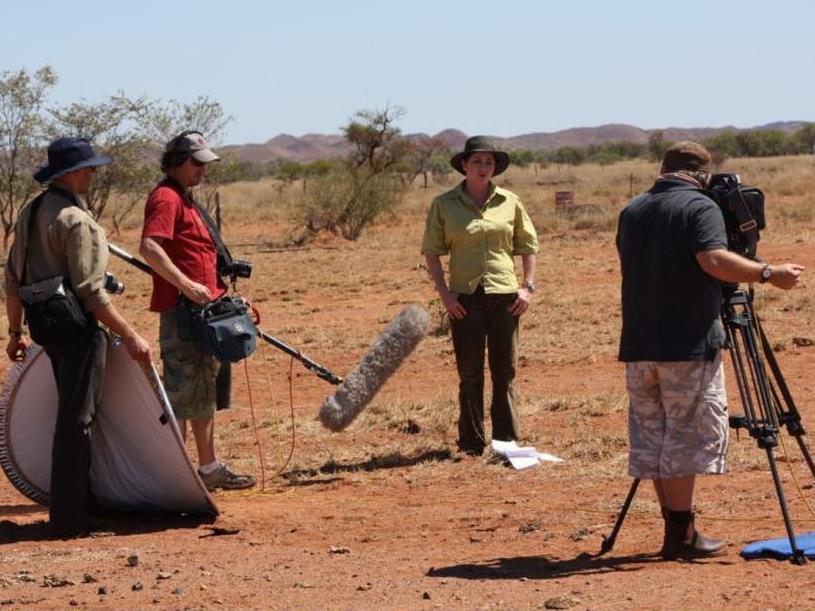Landline creating the national conversation. Image: Jess Porter.
Kim Dalton, the mild-mannered scourge of the ABC, launched another attack at 8.00 am on Day Two of the Australian Content Conversation curated by the ACMA. He is arguing that the ABC is an utterly vital institution, which needs to drive itself around cultural objectives, and to be accountable to the government. At the moment he claims it does neither.
His campaign started with his Currency Platform Paper, published two weeks ago.
Read more: Kim Dalton: how can we save the ABC from itself?
Campaign objectives
Dalton wants the ABC to be seen as a vital part of the national conversation about broadcast media. He wants it to work for its stakeholders, who are us. And he wants the government ‘to set up a governance structure within which its public purpose is clearly articulated and set by Government, where certain outcomes are clearly established and where the normal high standards of public sector accountability and transparency are mandated and adhered to.’
That would include minimum content requirements, a terms of trade deal with the production sector, amendments to the Charter and a Ministerial Statement of Expectations.
He also calls on the political parties ‘to develop policies which recognise and advance the artistic and cultural responsibilities of the ABC.’
Until today, the ABC has made no comment whatsoever on his proposals. However, the next round of Senate Estimates Hearings will run from 22 May to 2 June, and ABC CEO Michelle Guthrie will undoubtedly be confronted with juicy details from Dalton’s paper.
That silence is not surprising. This is a fundamental challenge to the ABC’s self-identity and outlines a very different engagement with government. It proposes a huge internal rethink which needs to be driven by the Board.
To Dalton, the silence proves the point. He told the audience, ‘It prefers to operate in splendid isolation. It prefers to wear the mantle of Australia’s great cultural institution while claiming independence from any public policy framework. Its independence has become the licence by which it refuses to engage in a broader cultural discourse and by which it refuses to commit to any outcomes, transparency or accountability around Australian content and Australia’s production and creative community.’
The response so far
Outside the ABC, how does Dalton assess the initial impact of his proposals?
‘I should say at the outset that I’m heartened by the openness of the response to the history, the analysis and the arguments I set out,’ he said. ‘It’s not easy to criticise the ABC. The institution is usually quick to defend itself and many of its loyal supporters can usually be relied upon to vociferously come to its defence. However, my critique, my observations and my proposals for change haven’t been met with the usual call to arms and circling of the wagons. The response hasn’t been the default position that you can’t criticise the ABC because it will provide ammunition to those who would like to erode its independence or to diminish and dismantle the institution itself.’
He took the comparative silence from the wider world as a positive sign.
‘The muted response from groups such as the Friends of the ABC, in part is probably due to sheer surprise at learning of the ABC’s decision to de-fund Australian content, particularly adult drama, documentary, Indigenous and children’s programs. I think it is also indicative of a growing concern within the community that in a quite fundamental way, the ABC has lost its way, that at least as far as its television service is concerned, it has been operating without an articulated and shared sense of public purpose.’
But, he claimed, ‘it’s refreshing that two significant issues have come to the fore as expressed by a range of people, including interestingly a number of industry colleagues.
‘First, people have been genuinely surprised to discover that the ABC is less engaged with Australian programs than the commercial networks. That it broadcasts less Australian programs than the networks. That in terms of non-news and current affairs programs, the ABC broadcasts less than half the number of hours of first release Australian programs during primetime than the networks. With regard to individual program genres, that the ABC broadcasts significantly less Australian adult drama than the networks and a lot less Australian children’s drama.
‘The second point of surprise expressed by many people was that there were no rules, no guidelines, no performance measures, no framework of any kind, around the level or nature of Australian content on the ABC. Not just that there weren’t regulations applying to the ABC, but that the ABC had no arrangement with government, that it had no framework in place, transparent and shared with the public or otherwise, which provided some guidance, targets and ambitions around Australian programs. Add to this, there is no definition of what constitutes an Australian program or what constitutes an Australian children’s drama. Both of which are strict requirements for the commercial networks.
‘This all goes to the absence of any rigorous policy discussion or consideration of the ABC about its relationship and impact on Australian screen culture, the creation of Australian screen content and Australia’s production and creative community.’
Scorched earth digital?
At this point, Dalton added something new, as he bought into the most fundamental existential discussion in the entire broadcast sector. Does conventional broadcasting have a future in a fully digital age?
Dalton argued that ‘traditional professionally produced long-form screen content, particularly television content, remains central and important to our culture and, in broader economic terms, to our creative industries.’
‘Unfortunately, our national broadcaster in recent years has spearheaded the position that we are fast approaching a post-television world, through its rhetoric, through its content strategies, through its deteriorating relationship with the independent production sector and through its allocation of resources.’
ABC CEO Michelle Guthrie made a landmark address to the New News Conference at Melbourne University’s Centre for Advancing Journalism in October 2016 which laid out her public position. ‘There is no mass media now. Different demographics congregate around different platforms. Media companies that try to corral all their audiences in one place or who rely on “loyalty” to keep them there do so at their peril.’
Again and again she has emphasised the need to find audiences where they really are, to chase a younger generation, to push content across broadband and mobile, to iView and Facebook. A month ago, the Australian claimed that the new business plan for ABC News ‘is set to more than double funding and activity aimed at digital audiences over the next three years’.
There is a substantial subtext to this, connected to long-standing fears that the ABC could actually abandon broadcasting and reinvent itself as an internet provider. Mark Scott was given to musing about this, to the horror of observers. By this reading, the sensible idea that the ABC should be a prime internet provider is just the thin edge of the wedge with Armageddon at the other end.
According to Dalton, ‘the notion of the medium’s demise is firmly embedded in the media zeitgeist. It has been for some time, including while I was at the ABC, and I can assure you it has and continues to inform policy.
‘It has lead at least in part to the re-allocation of resources we have seen at the ABC in recent years away from drama, documentary and children’s content into the black hole of digital innovation. It has lead to the allocation of resources towards low cost short-form content not primarily designed for broadcast which because of the tiny numbers it attracts can end up being more expensive on a per viewer basis than high budget traditional content.
‘It leads to a disregard and de-valuing of the skills, expertise and professional standing of the producers and creative workforce that make up our screen production industry. Ultimately, it anticipates an imagined future and proposes the dismantling of the strategies and structures that have supported the development of an Australian screen culture and screen production sector.’
The problem proves his point. The ABC is able to make a fundamental change to its approach which would have a devastating impact on the wider production community – and nothing can stop it. It can do exactly what it wants according to whatever theories its senior executives concoct.
The smell of a red herring?
Why is he making this argument here? It relates directly to the ACMA’s content conversation, because support and regulation is so different for online distribution. It enables him to argue that the sector needs to protect itself by fighting to regulate the ABC.
However, it could also be a major diversion into a separate argument on a battlefield that suits the ABC. On the surface the ABC absolutely should be going digital, chasing audiences and embracing younger people. Many of our readers benefit directly from those low budget production strategies. The fear of the Armageddon option is a slippery argument, based on suspicion with straw men waiting to come out, because we don’t have the data to fight the case and it probably doesn’t exist.
Dalton emphasised that long form storytelling is our most popular cultural pastime, and that ‘live viewing on the large and traditional television device remains overwhelmingly the dominant form of viewing. Less overall and certainly less for young people, but even for them still the dominant form.’ It is an argument which unites government and commercial broadcasters, which is fiercely argued by Seven in particular.
Why the ABC is immune from chaos in the mediascape
He went on to say that the declining numbers are not the primary concern for a public broadcaster, ‘which is in the privileged position of not having to respond commercially to the challenges posed by all this digital disruption.’
In a way he is arguing that the whole horrible mess confronting commercial broadcasters doesn’t matter to the ABC. The declining value of television advertising and the rise of Facebook and Google is a revenue disaster for commercial television, but irrelevant to the ABC. Instead, it has the government revenue to engage in the fundamental fight in digital culture – to catch Australian audiences with Australian content wherever they are and on any medium, now and into the future.
The years in which the ABC engaged constructively with the government about resources and content for ABC TV demonstrated that partnership pays. Dalton is arguing day by day that the relationship needs to have an institutional framework which sets targets and encourages transparency so the community can see what it gets for its investment. As commercial television suffers, the value of the ABC can only increase if it is given the chance.
Unfortunately, the situation for the screen sector is much tougher. While Dalton argues that the industry needs the ABC and is being betrayed by it, the industry knows it also needs the commercial networks which are bleeding. The screen sector depends on a combination of taxpayer money and advertising income and if that breaks down from any side, it will become seriously unglued.
What will happen internationally is anyone’s guess.





